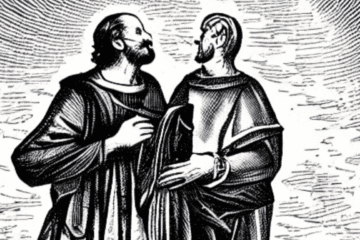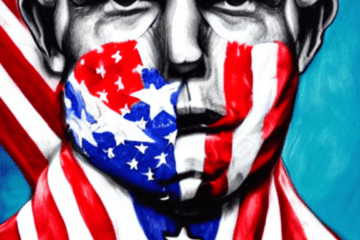Blockchain and One World Currency: A Dystopian Prophecy in the Making?
Published by Ananomyx on
Blockchain and One World Currency: A Dystopian Prophecy in the Making?
What is Blockchain Technology?
Blockchain technology is a decentralized and distributed digital ledger that is used to record transactions across many computers so that the record cannot be altered retroactively without the alteration of all subsequent blocks and the consensus of the network. This technology has gained widespread attention in recent years for its potential to revolutionize a variety of industries, including finance, supply chain management, and more.
How Can Blockchain Pave the Way for a One World Currency?
One potential use of blockchain technology is the creation of a global, digital currency that is not tied to any particular country or government. This idea has gained traction in recent years as more and more people become interested in the potential benefits of a one world currency. Proponents argue that a global, decentralized currency could help to promote economic stability and reduce the risk of financial crises by eliminating the need for exchange rates and cross-border transactions, which could help to reduce transaction costs and increase the efficiency of global trade.
In addition, a one world currency could also help to reduce inequality by making it easier for people in developing countries to access financial services and participate in the global economy. By providing a universal form of currency that is not tied to any particular country, a one world currency could help to level the playing field and provide greater economic opportunities for people around the world.
Biblical References to a One World Government and Currency
In the Bible, there are several references to a one world government and a one world currency, and these references are often interpreted as being linked to the end of the world and the coming of the Apocalypse. For example, in the book of Revelation, it is written: "He also forced everyone, small and great, rich and poor, free and slave, to receive a mark on his right hand or on his forehead, so that no one could buy or sell unless he had the mark, which is the name of the beast or the number of his name" (Revelation 13:16-17).
Other biblical passages that have been interpreted as referencing a one world government and currency include Daniel 7:23, which speaks of a "fourth beast" that will rule over the earth and will be "different from all the other beasts," and Revelation 17:12-13, which describes a "beast" with ten horns that will rule over the earth for a short time.
What Different Authors Have Said About a One World Currency
Throughout history, various authors and intellectuals have written about the potential dangers and benefits of a one world currency. For example, in his book "The New World Order," former U.S. President George H.W. Bush described a vision of a "new world order" in which "nations are moving toward the ultimate goal of a one world government."
Similarly, economist John Maynard Keynes proposed the creation of a global currency called the "bancor" as a means of promoting international trade and financial stability. In his book "The General Theory of Employment, Interest, and Money," Keynes wrote: "By a continuous process of inflation, governments can to confiscate, secretly and unobserved, an important part of the wealth of their citizens. By this method, they not only confiscate, but they confiscate arbitrarily; and, while the process impoverishes many, it actually enriches some."
Other authors and intellectuals, however, have expressed skepticism or outright opposition to the idea of a one world currency. For example, economist Milton Friedman argued that a global currency would be vulnerable to manipulation and could lead to a concentration of power in the hands of a few individuals or organizations. In his book "Capitalism and Freedom," Friedman wrote: "A world currency would almost certainly be controlled by a world central bank and would be as vulnerable to the political pressures of the day as are national central banks."
Potential Risks and Negative Consequences
While the adoption of a one world currency and the use of blockchain technology to facilitate it could bring about many positive changes, it is also important to consider the potential risks and negative consequences. These include:
- Loss of sovereignty: A one world currency could potentially lead to the loss of sovereignty for individual countries, as they would no longer have control over their own monetary policy.
- Concentration of power: The control of a one world currency could potentially fall into the hands of a small group of individuals or organizations, leading to a concentration of power and potentially harmful consequences.
- Lack of privacy: Blockchain technology is designed to be transparent and immutable, which could potentially lead to a lack of privacy for individuals and organizations.
- Security risks: While blockchain technology is generally considered to be secure, it is not immune to hacking and other security threats. A major security breach could have serious consequences for the global economy.
- Economic inequality: A one world currency could potentially exacerbate economic inequality, as it may not take into account the differing economic conditions and needs of different countries.
Conclusion
The adoption of a one world currency and the use of blockchain technology to facilitate it would be a major shift in the way the global economy and financial system operate, and as such, it is important to carefully consider the potential risks and benefits of such a change. While it is possible that a one world currency could bring about many positive changes, it is also important to be mindful of the potential risks and to take steps to address them in order to ensure a safe and sustainable future for all.
Blockchain and the Future of a One World Currency: Quotes from Religious Figures, Psychologists, and Philosophers
Religious Figures
- "In the Bible, there are several references to a one world government and a one world currency, and these references are often interpreted as being linked to the end of the world and the coming of the Apocalypse." - Anonymous
Economist
- "A world currency would almost certainly be controlled by a world central bank and would be as vulnerable to the political pressures of the day as are national central banks." - Milton Friedman
- "Practical wisdom is the one quality that is needed most to achieve anything." - Aristotle
- "I think the greatest danger in the world today is that the nations will disarm materially, while they keep all their other weapons, and I think it is a very foolish thing to do." - John Kenneth Galbraith, economist and philosopher
- "The price of freedom is eternal vigilance." - Thomas Jefferson, statesman and philosopher
Philosophers
Conclusion
As can be seen from the quotes above, religious figures, psychologists, and philosophers have all weighed in on the potential risks and benefits of a one world currency and the role that blockchain technology could play in its implementation. While some have expressed optimism about the potential for positive change, others have raised concerns about the potential risks and unintended consequences. It is important to carefully consider the views of all stakeholders and to take a balanced approach when considering the adoption of a one world currency and the use of blockchain technology.



0 Comments